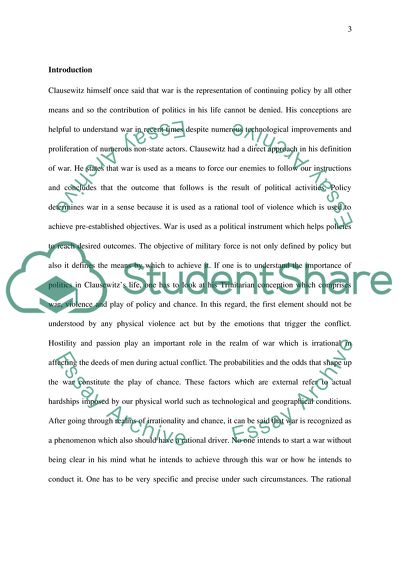Cite this document
(Clausewitzs Conception of the Relationship between War and Politics Useful for Understanding Warfare Post-1990 Essay Example | Topics and Well Written Essays - 2000 words, n.d.)
Clausewitzs Conception of the Relationship between War and Politics Useful for Understanding Warfare Post-1990 Essay Example | Topics and Well Written Essays - 2000 words. https://studentshare.org/history/1809061-is-clausewitzs-conception-of-the-relationship-between-war-and-politics-useful-for-understanding-warfare-post-1990
Clausewitzs Conception of the Relationship between War and Politics Useful for Understanding Warfare Post-1990 Essay Example | Topics and Well Written Essays - 2000 words. https://studentshare.org/history/1809061-is-clausewitzs-conception-of-the-relationship-between-war-and-politics-useful-for-understanding-warfare-post-1990
(Clausewitzs Conception of the Relationship Between War and Politics Useful for Understanding Warfare Post-1990 Essay Example | Topics and Well Written Essays - 2000 Words)
Clausewitzs Conception of the Relationship Between War and Politics Useful for Understanding Warfare Post-1990 Essay Example | Topics and Well Written Essays - 2000 Words. https://studentshare.org/history/1809061-is-clausewitzs-conception-of-the-relationship-between-war-and-politics-useful-for-understanding-warfare-post-1990.
Clausewitzs Conception of the Relationship Between War and Politics Useful for Understanding Warfare Post-1990 Essay Example | Topics and Well Written Essays - 2000 Words. https://studentshare.org/history/1809061-is-clausewitzs-conception-of-the-relationship-between-war-and-politics-useful-for-understanding-warfare-post-1990.
“Clausewitzs Conception of the Relationship Between War and Politics Useful for Understanding Warfare Post-1990 Essay Example | Topics and Well Written Essays - 2000 Words”. https://studentshare.org/history/1809061-is-clausewitzs-conception-of-the-relationship-between-war-and-politics-useful-for-understanding-warfare-post-1990.


